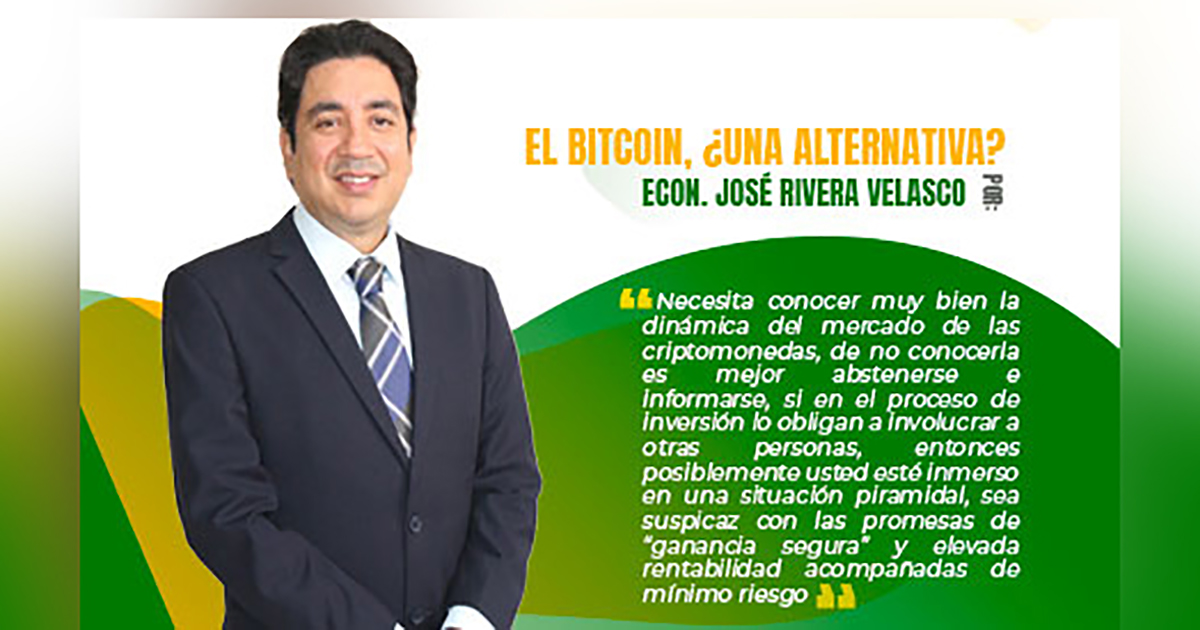Bitcoin, an alternative?
Published on 24 from June from 2021

The fact that El Salvador has decided through the Executive to enact a law that allows its citizens to adopt bitcoin (BTC) has caused agitation, mainly in networks.
As an official currency, setting a precedent for other countries, developed or otherwise, to emulate. It is worth remembering that El Salvador, along with Ecuador, is one of the few countries in the world that adopted the US dollar as a method of payment.
It should be noted that according to its creator Satoshi Nakamoto, bitcoin is an electronic cash system, based on cryptographic proof, which allows parties to transact directly with each other, without the need for a third party, which is replaced by a peer-to-peer (decentralised) network that keeps a chronological record of transactions. These features, including the fact that it is open source software, make it the most popular digital medium of exchange among cryptocurrencies.
In addition, it has data technologies (encrypted transactions) whose records or ledgers avoid duplication and avoid the problem of double payment, which makes it similar to electronic money and, therefore, to ordinary money. BTC has been recognised as a store of value because people give in exchange cash, gold or any other asset that protects value, this allows them to carry out transactions at a lower cost and in less time. However, it is important to bear in mind that BTC is not controlled by any State, has no supervision or regulation and has no official backing from the world's Central Banks, ergo, it is not a legal monopoly of compulsory tender unless a law states otherwise.
So far, Banco Bilbao Vizcaya Argentaria (BBVA), Mastercard, Pay Pal, Microsoft, Dell, Starbucks, Steam, among others, are some of the large corporations that allow their customers to trade with BTCs. On the other hand, the Tesla corporation, after seven weeks of accepting them as a means of payment, warns that data mining causes high energy consumption and low sustainability in use, not contributing to the millennium goals of having a healthier planet with the smallest possible carbon footprint, and later the ecological organisation Green Peace, which has been accepting this option since 2014, would join this cause. For its part, China has banned the use of any currency other than the "people's currency", the yuan, while South Korea and Brazil are trying to impose restrictions.
Returning to El Salvador, before the enactment of the Law they had a voluntary social experiment where a small coastal community, El Zonte, now known as Bitcoin Beach, would receive from an anonymous donor (bitcoin whale) approximately 45 dollars in BTCs for around 500 families who, thanks to an application on their mobile phones, could carry out buying and selling transactions. The idea was to generate new businesses related to beach tourism and attract tourists pleased with the possibility of earning their holidays in BTCs, however, one of the main complaints of the villagers was that the payment application on their mobile phones consumed a lot of data and El Salvador is not characterised as a country where prepaid data plans are cheap and where its internet service is fast and efficient, Moreover, the damaged mobile phones did not facilitate transactions in a reasonable time, so they opted not to accept BTCs and settled their debts with dollars in cash.
Article 7 of the Bitcoin Law states: Every economic agent must accept bitcoin as a form of payment when it is offered to him by the person purchasing a good or service.
At the time, economist J.P. Koning in a publication based on Dror Goldberg's research on BTCs stated:
"If you participate in an exchange that does not involve the settlement of debts, legal tender laws do not apply. For example, suppose you walk into a corner shop and offer to pay for cigarettes with legal tender platinum coins. The shop owner can legally refuse to accept the coins. This is because the two parties are not settling debts, they are engaging in a cash transaction. The owner is on the side of the law if he demands payment in, say, peanuts. You either pay in peanuts or you leave the shop without your cigarettes".
The Chamber of Commerce of El Salvador, faced with the possibility that many Salvadorans will be forced to use BTCs against their will as soon as the law comes into force, elaborates and subsequently exposes the results of a survey where it finds that 92% of the 1 600 Salvadorans surveyed did not agree with Art. 7, 93.2% did not want to see their salaries converted into BTCs and 82.5% did not want to receive remittances in BTCs. In such a case, the Law is not only Art 7, but according to several economic analysts in that country, there is no perceived scenario in which citizens would have spontaneously adopted BTC as their first choice means of payment without being forced to do so. Perhaps this experiment will soon be carried out in other countries, perhaps the results will be different in spirit considering their currency and BTC as legal and sufficient, but not necessary, means to settle existing debts.
In Ecuador there has been no similar experiment, however, if we are talking about experiences with BTC, we could refer to what happened in the Ecuadorian highlands in mid-2017, where unscrupulous people sold the illusion of prosperity and wealth by promising significant profits by investing in cryptocurrencies, 1 500 peasants from the communities settled in Otavalo, Cayambe, Ambato, Pujilí, Saquisilí, Salcedo, Pastaza, Azogues and Riobamba denounced through the Justice Commission of the Indigenous and Peasant Movement of Cotopaxi (MICC) massive scam with cryptocurrencies, mainly BTC, each of them would have delivered between 100 and 1. 000 dollars to earn interest in the short term of 300 and 3 600 dollars, respectively.
In the Ecuadorian case, bitcoin fever was generated by the high prices observed at the end of 2016, reaching a record of 17 161 dollars in the regular market and 20 000 in the futures market; however, six months later, the price had reached 10 000 dollars. This high volatility, which may well be the product of a bubble, is also due to the unpredictable nature of BTCs, making them a high-risk bet. In 2020, only 15 out of 100 experts predicted that BTC would be worth more than $25,000 in the next five years; now, almost two thirds are betting on it. To date, BTC is close to $34,000, in which case it is likely to fall by up to 70%, and it is also possible that it will rise by much more than 70%.
Because of BTC's volatility and natural human risk aversion, Joey Krug, co-chief investment officer of Pantera Capital Portfolio, says that if your investment in BTC is much higher than other assets, you will inevitably panic and sell as soon as it goes down, because investing in BTC and other cryptocurrencies is a long-term project "and not for the faint of heart".
However, if despite these volatilities you decide to invest tomorrow, you may find some useful tips; remember that BTC is a virtual currency, it is not printed like banknotes, for its disposal complex calculation processes are required, if you want to invest look for the website localbitcoins. If you want to invest, you need to know very well the dynamics of the cryptocurrency market, if you do not know it, it is better to abstain and inform yourself, if in the process of investment you are forced to involve other people, then you may be involved in a pyramid situation, be suspicious of promises of "safe profit" and high profitability accompanied by minimal risk.

